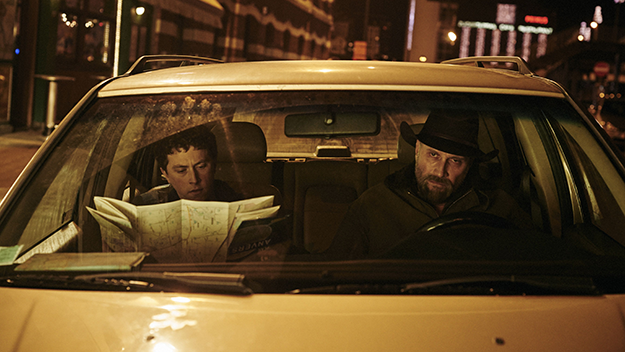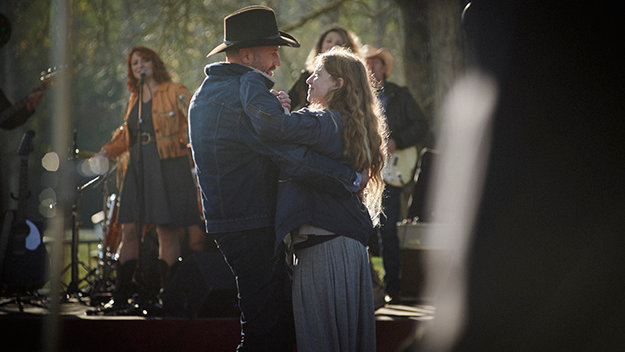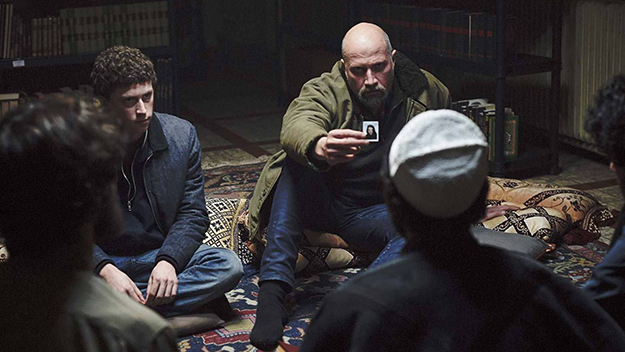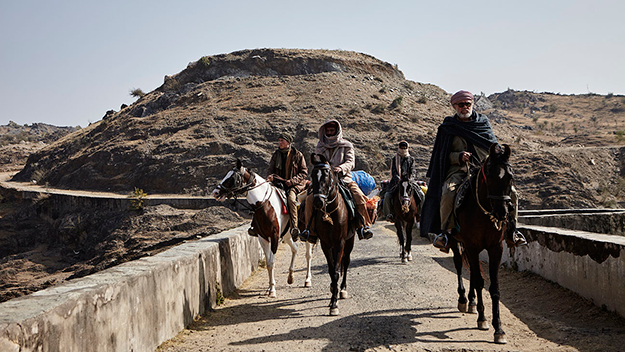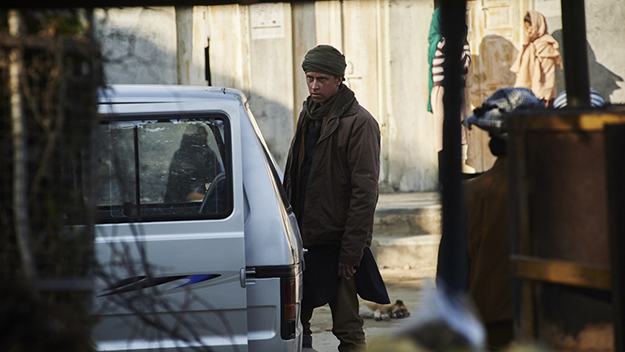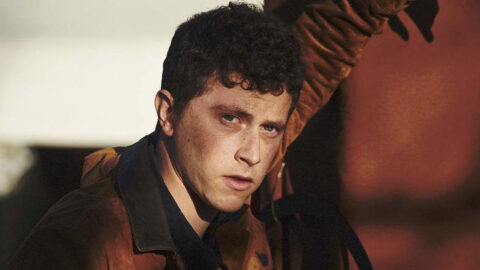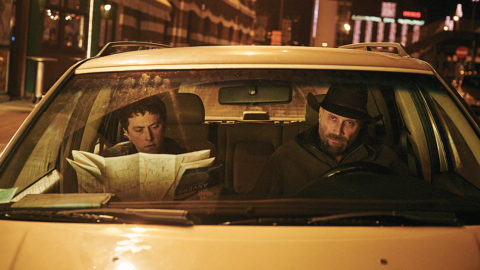Film of the Week: Les Cowboys
There are plenty of Stetsons on view, as you’d expect in a movie named Les Cowboys, the directing debut of screenwriter Thomas Bidegain, and they’re worn by French people. In essence, this is a modern-day revision of John Ford’s The Searchers, updating its quest narrative for contemporary France much as Paul Schrader updated it for late ’70s California in his George C. Scott vehicle Hardcore. However, it’s not just France that interests Bidegain, but an entire changing world. Where John Wayne’s Ethan Edwards went looking for a young girl abducted in a Comanche raid, Bidegain’s ostensible hero is a father searching for a daughter who has left her family of her own volition to be with her Muslim boyfriend.
Les Cowboys depicts a particular period, from the 1990s into the next decade, during which both America and Europe—a Europe that in many ways wants to be America—was forced to stock of a world that was changing unrecognizably around it. The very moment of that change is evoked in one telling sequence. About halfway through Les Cowboys, Bidegain lays in a couple of seemingly unmotivated shots of a small, peaceful French town with empty streets. One shot is of the exterior of a café; he then cuts to the interior, where a stunned crowd is watching live TV coverage of the 9/11 attacks. In isolation, those two exteriors are nothing special. In context, we realize they depict the last breath before the world changes forever—although Les Cowboys reminds us that it had already been changing by then.
This quietly punchy debut shows all the confidence you would expect from the co-writer on Jacques Audiard’s recent films, from A Prophet on; Bidegain co-writes here with his Dheepan collaborator Noé Debré (with an additional story credit for Laurent Abitbol). Les Cowboys is a provocative film, rather as The Searchers has continued to be. Last October, I interviewed Bidegain on stage at a London Film Festival screening, at which a couple of audience members strongly objected to the film; they found the father character not only racist but also offensively possessive towards his daughter, suggesting that the film itself was both sexist and Islamophobic. Other audience members came to the defense of Les Cowboys on both counts (one, I remember, started by saying, “As an Algerian woman…”).
I can’t see any way that Les Cowboys could be read as overtly Islamophobic; rather, it’s about racism and Islamophobia much in the same way that The Searchers is about racism and the history of hatred towards Native Americans, as embodied in John Wayne’s vengeful, unforgiving Ethan Edwards. Les Cowboys is also a critique of Europe’s long-term identity crisis—of the fantasies that Europeans have of being American.
The film kicks off with a dose of down-home shit-kickin’ Americana—close-ups of hat brims pulled low, collars pulled up on denim jackets, bandanas carefully adjusted on necks. We’re at a sort of rodeo event—there’s line dancing, even an electric bucking bronco—but it’s actually a country and western fair somewhere in southeastern France. Prominent in the crowd are a local couple, Alain and Nicole Balland (François Damiens and Agathe Dronne), who are so into the whole cowboy thing that they’ve given their children American names, Kelly and Kid (though the latter, we later learn, is really Georges).
Alain, by day an executive in a local company, steps onstage to sing his specialty number with the band. It’s that old lament “The Tennessee Waltz,” made famous by Patti Page, and after he’s sung his verse, reticent teenage Kelly (Iliana Zabeth) joins him to dance to it—after which he leads her off, arm around her, a proud and visibly possessive dad. But Alain won’t be seeing her again in a hurry: it’s no coincidence that the song is about someone being stolen away from the person who loves them.
But Kelly hasn’t been stolen away—though Alain finds it hard to see the situation otherwise. When she disappears from the fair, it turns out that she’s chosen to leave with her boyfriend Ahmed. Her parents don’t quite know how to react when they discover that she has been learning Arabic, and that she’s in possession of Islamist leaflets; for the year is 1994, an age before the radicalization of converts to Islam became an everyday feature of world news. Alain is convinced that Kelly has been kidnapped, and quickly flies into a hostile rage when he talks with Ahmed’s sympathetic father (Djemel Barek), who’s every bit as much at a loss as he is.
Kelly writes to say that she’s leading her own life, but that doesn’t stop Alain from embarking on an obsessive quest to find her. Following various leads, he drives round France and beyond; Bidegain and DP Arnaud Potier are good at capturing the atmosphere and the vastness of Europe by night and evoking a modern European “badlands,” embodied in one scene by the outskirts of a Belgian town where there are no street signs.
Alain looks—but doesn’t necessarily see. In one town, he’s befriended by a North African man who wants him to know what sort of impoverished living conditions his community must contend with; “I don’t give a shit,” Alain snarls. In northern France, he finds himself on a campsite where Gypsies live even more roughly. There, he loses his cool when he spots a young girl wearing the red bandana he tied round Kelly’s neck at the fair: this film’s nod to the identifying medal that Ethan gives young Debbie in The Searchers. But in this case, it seems most likely that this is just any old red bandana, Alain’s monomaniacal desire to recognize getting the better of him.
Suddenly—just as seasons and years pass to disorienting effect in Ford’s film—we realize we’ve skipped several years. Kid is no longer a kid (played, aged 13, by Maxim Driesen), but a young adult (25-year-old up-and-comer Finnegan Oldfield). The search is still on, and Kid has joined his dad on the road, playing Jeffrey Hunter’s Martin to Alain’s Ethan. This is another recent mainstream drama that employs dramatic unexpected time jumps, like Derek Cianfrance’s The Place Between the Pines, or Pedro Almodóvar’s latest film Julieta, both stories about traumas passed on from one generation to the next (Julieta, as it happens, is also about the enduring ache caused by the disappearance of a daughter). It’s when Alain and Kid are on the road—or rather, on the sea—to Antwerp, that Bidegain throws in one of the film’s most overt visual tributes to Ford, albeit a subtle one. It’s an image from behind of father and son on a ship, Kid caught in a doorway, Alain slumped beside him, framed through a door, both looking out at a grey sea: a melancholy Europeanization of Ford’s iconic door-framed shots of the endless American outdoors.
In this section, Bidegain stages the change in the family’s situation with neat economy: a shot of Kid siphoning petrol from a truck shows us the straitened circumstances that his father’s quest has got them into. Around the halfway mark, however, the film takes a new turn, as Alain drops out of the picture—in a way that seemed to me a little superfluously dramatic, but I’m guessing that Bidegain couldn’t resist a big flashy coup de cinéma now that he’s behind the camera. Anyway, from this point on the story is Kid’s, and the film becomes a different kind of quasi-Western, channeling genre iconography even more openly—with horses, even. Kid is now working in Afghanistan as a volunteer on an aid mission, and still searching for Kelly; it’s hard to tell whether he’s there because of his humanitarian instincts, or whether they’re simply a front for his inherited monomania.
It’s there that he meets a different sort of cowboy—an unnamed American (played by John C. Reilly, face obscured by a dust cloud of beard), who enlists Kid for another mission. Reilly’s character is a self-styled “trader,” whose occupation it is to exchange money for people; we don’t know whether he’s a government official or working for some sort of corporate body like Halliburton, but his current mission is to release a pair of Belgian engineers abducted by insurgents. A fluent linguist, he’s another Ethan figure, a sort of scout and crosser of boundaries; he’s seen smoking with Afghan chiefs, just as his genre counterparts would have passed the calumet.
His mission with the American will lead Kid to a moment of truth—and thereby to a resolving string of other moments of truth, as the film’s drama of understanding and misunderstanding plays itself out. However, the second half of Les Cowboys isn’t nearly as persuasive as the first, partly because it unconvincingly becomes an adventure as opposed to the troubling psychological/cultural study it begins as; and partly because Oldfield isn’t nearly as compelling a screen presence as Belgian actor Damiens, a specialist in anxious fathers (cf. Katell Quillévéré’s Suzanne) who abandons his usual lunkish affability here for something much more intense, menacing, and helplessly troubled.
The Afghanistan episode, however, does contain a nice revelatory moment of musing that is as apposite a comment on Ford’s film, and indeed on any quest narrative, as it is on Les Cowboys itself. As he and Kid sit gazing out on a vast hilly landscape—it could be Texas, it could be Helmand Province—the Reilly character comments, “I could never go back. Too big out here… There’s no room for people like us back where we’re from.” Bidegain is declaring his commitment to the type of cinema in which every journey is by necessity a journey of no return.
As for that accusation of Islamophobia, what emerges over and over again is European incomprehension of Islam at a moment when the West has to familiarize itself overnight with a new cultural, political, ideological map of the world (which, as this century has shown so far, it has struggled to do). But the most fascinating aspect of Les Cowboys is its depiction of how, in this changing world, everyone is searching for an identity—people of East and West, the secular as much as the religious—and flailing to know who they are. Its principal characters are Europeans who over-identify with America; understandable, then, that their daughter might throw in her lot with European Muslims desperate to find a rooted identity of their own. In Afghanistan, the Reilly character asks Kid: “There’s a war going on. What side are you on?” Kid replies: “No one’s side.” But the 21st century—as Les Cowboys pinpoints so astutely—doesn’t allow anyone to easily avoid taking sides. And if you’re going to be on one side or another, the first thing you have to decide is what role to play—or rather, what hat to wear.
Jonathan Romney is a contributing editor to FILM COMMENT and writes its Film of the Week column. He is a member of the London Film Critics Circle.



